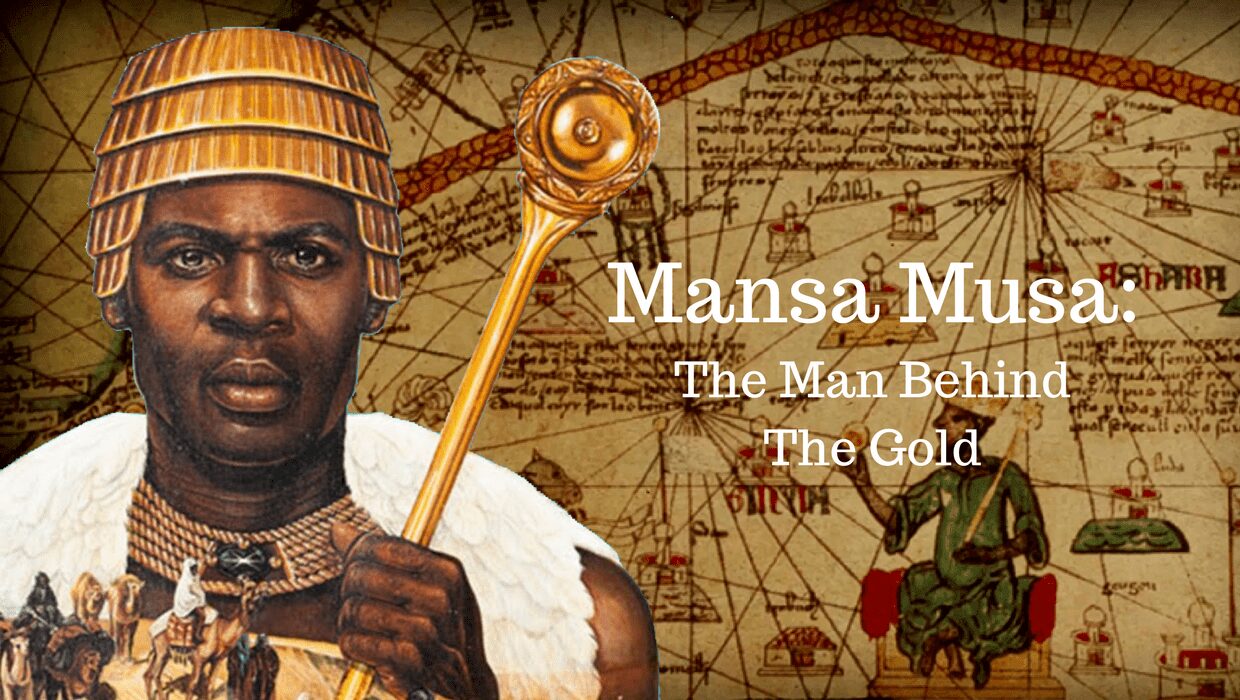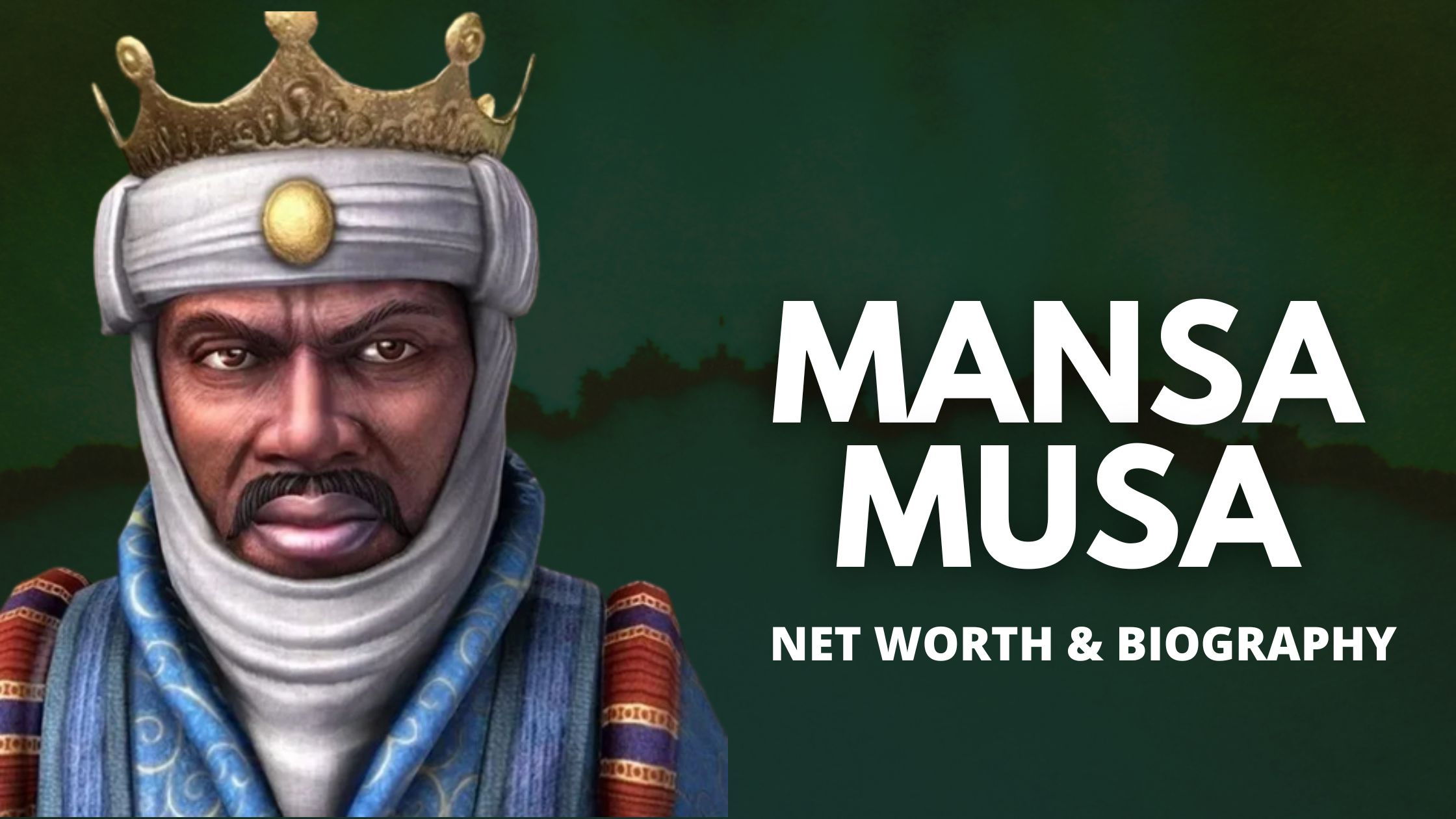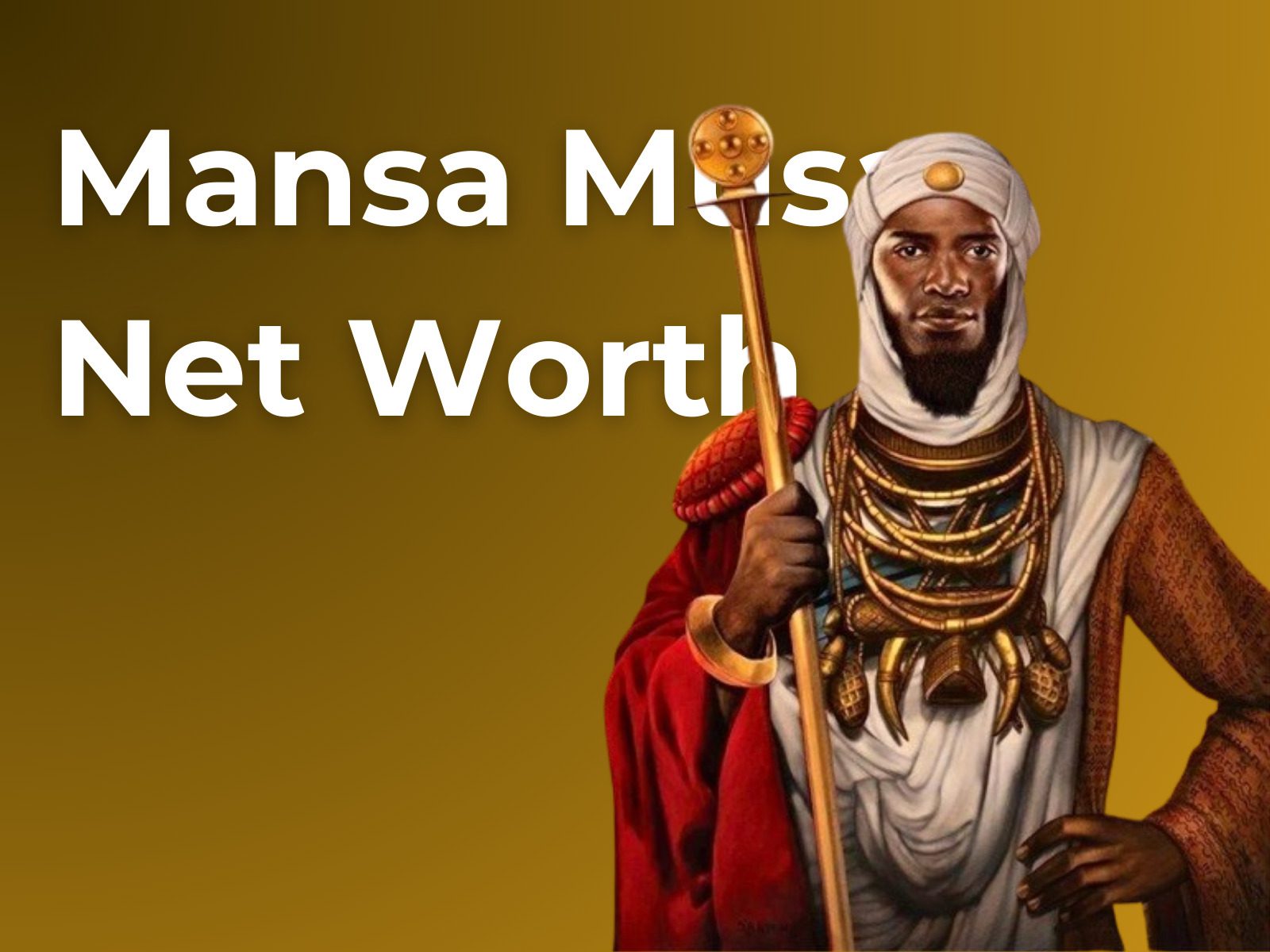The Astounding Wealth Of Mansa Musa: Uncovering His Net Worth In 2024
Mansa Musa was the tenth Mansa (king) of the Mali Empire, which existed from the 13th to the 17th century in West Africa. He is best known for his fabulous wealth, which was said to be greater than that of any other ruler in history. In 1324, he made a pilgrimage to Mecca that lasted for several years and included a caravan of 60,000 people and 100 camels, each carrying 300 pounds of gold. Musa's wealth and generosity were legendary, and he is often credited with helping to spread the fame of the Mali Empire throughout the world.
Musa's net worth is difficult to estimate, as there are no reliable records from his time. However, some historians have estimated that his wealth would be worth around $400 billion in today's money. This would make him one of the richest people in history, even by modern standards.
Musa's wealth was not just a personal fortune. He used his resources to improve the lives of his people and to promote trade and scholarship. He built mosques, schools, and libraries throughout his empire, and he encouraged learning and the arts. Musa's reign was a golden age for the Mali Empire, and his legacy continues to inspire people today.
- Gladstein Family Today
- How Much Is Kai Cenat Net Worth
- What Is The Net Worth Of Chip Joanna Gaines
- Joyce Meyer Ministries Home
- Larry David Worth
Mansa Musa Net Worth 2024
Mansa Musa, the 10th Mansa (king) of the Mali Empire, is renowned for his immense wealth. In 1324, during his pilgrimage to Mecca, he showcased his opulence through a lavish caravan that included 60,000 people and 100 camels carrying 300 pounds of gold each. His wealth and generosity earned him widespread fame, and historians estimate his net worth to be around $400 billion in today's terms.
- Gold: Musa's wealth was largely derived from the gold mines of his empire.
- Trade: He controlled major trade routes, facilitating the exchange of goods and ideas.
- Pilgrimage: His famous journey to Mecca displayed his wealth and piety.
- Legacy: Musa's wealth and influence continue to inspire and fascinate people today.
- Empire: His vast empire contributed to his economic power.
- Philanthropy: Musa used his wealth to support education, architecture, and the arts.
Mansa Musa's wealth extended beyond material possessions. He invested in his people, building mosques, schools, and libraries throughout his empire. His patronage of scholars and artists fostered cultural and intellectual growth. Musa's legacy as a wealthy and generous ruler underscores the importance of responsible wealth management and the positive impact it can have on society.
1. Gold
Mansa Musa's vast wealth was primarily attributed to the abundant gold mines within his empire. The Mali Empire controlled significant gold-producing regions, allowing Musa to amass immense riches. This gold wealth played a crucial role in shaping his net worth and contributing to his renowned status as one of the wealthiest rulers in history.
- Gold as Currency
Gold served as a primary medium of exchange and store of value during Musa's reign. The vast quantities of gold extracted from the mines provided Musa with substantial financial resources, enabling him to fund his lavish lifestyle, support trade and commerce, and maintain a powerful army.
- Economic Power
Control over the gold mines granted Musa significant economic power. He could influence the gold market, regulate its supply, and generate substantial revenue through taxation and trade. This economic dominance further contributed to his immense wealth and allowed him to expand his empire's influence.
- International Fame
Musa's wealth and lavish spending, fueled by the gold mines, gained him international recognition. His famous pilgrimage to Mecca in 1324, where he distributed gold generously, showcased his immense wealth and cemented his status as one of the richest and most influential rulers of his time.
In conclusion, the gold mines of his empire served as the cornerstone of Mansa Musa's extraordinary wealth. The abundance of gold provided him with financial resources, economic power, and international fame, contributing significantly to his overall net worth and shaping his legacy as one of the wealthiest rulers in history.
2. Trade
Mansa Musa's control over major trade routes played a pivotal role in shaping his immense wealth and contributing to his net worth in 2024. By facilitating the exchange of goods and ideas, Musa was able to generate substantial revenue and establish a prosperous trading empire.
- Control of Trade Routes
Musa's empire held strategic control over major trade routes connecting West Africa to North Africa, the Middle East, and Europe. This gave him significant influence over the flow of goods, such as gold, salt, ivory, and slaves, allowing him to impose taxes and tariffs on traders.
- Economic Growth
The thriving trade routes fostered economic growth within Musa's empire. Merchants and traders from various regions brought their goods to Timbuktu, the capital of the Mali Empire, which became a renowned center of commerce and scholarship.
- Cultural Exchange
The exchange of goods was accompanied by the exchange of ideas and knowledge. Musa's empire became a melting pot of cultures, where scholars, merchants, and travelers from different backgrounds shared their knowledge and innovations, leading to advancements in various fields.
- Increased Wealth
The revenue generated from trade significantly contributed to Mansa Musa's wealth. By controlling the trade routes and imposing taxes, Musa accumulated vast amounts of gold and other valuable resources, making him one of the wealthiest rulers of his time.
In summary, Mansa Musa's control over major trade routes was a key factor in generating wealth and establishing his prosperous empire. The exchange of goods and ideas fostered economic growth, cultural exchange, and increased Musa's net worth, making him one of the wealthiest individuals in history.
3. Pilgrimage
Mansa Musa's famous pilgrimage to Mecca in 1324 was a pivotal event that not only showcased his immense wealth but also solidified his reputation as a devout Muslim ruler. This journey significantly contributed to his overall net worth in 2024 through the following aspects:
- Lavish Expenditure
Musa's pilgrimage was marked by unparalleled extravagance and generosity. He traveled with a caravan of 60,000 people, including an entourage of officials, scholars, merchants, and soldiers. The caravan also included 100 camels, each carrying 300 pounds of gold, which Musa distributed along the way to the poor and needy.
- Economic Impact
Musa's journey had a profound economic impact on the regions he traversed. The sheer size of his caravan and the lavish spending of his entourage stimulated trade and commerce. Musa's distribution of gold helped alleviate poverty and boost economic growth in the areas he visited.
- Political Prestige
The pilgrimage solidified Musa's political prestige and strengthened diplomatic ties between the Mali Empire and other Islamic nations. His generous gifts and pious conduct earned him the respect and admiration of rulers and scholars throughout the Muslim world, enhancing his reputation as a wealthy and influential leader.
- Religious Significance
As a devout Muslim, Musa's pilgrimage was a deeply personal and spiritual experience. His commitment to his faith and his adherence to Islamic principles further cemented his authority and legitimacy as a ruler, contributing to his overall net worth by strengthening his political and social standing.
In conclusion, Mansa Musa's pilgrimage to Mecca was a multifaceted event that played a significant role in shaping his net worth in 2024. His lavish expenditure, economic impact, political prestige, and religious significance all contributed to his immense wealth and legacy as one of the wealthiest rulers in history.
4. Legacy
Mansa Musa's legacy as a wealthy and influential ruler extends beyond his lifetime, significantly contributing to his net worth in 2024. His wealth, piety, and patronage of scholarship and the arts have left a lasting impact on Mali, Africa, and the broader Muslim world.
Musa's immense wealth, famously displayed during his pilgrimage to Mecca, continues to fascinate people today. His generous distribution of gold and other riches along the way earned him a reputation as a benevolent and pious ruler, enhancing his legacy and solidifying his status as one of the wealthiest individuals in history.
Furthermore, Musa's patronage of education and scholarship played a crucial role in the development of Timbuktu as a renowned center of learning. He established libraries, mosques, and universities, attracting scholars and students from across the Muslim world. This legacy of intellectual achievement and cultural exchange contributes to Musa's enduring fame and net worth in 2024.
In conclusion, Mansa Musa's legacy of wealth, influence, and cultural patronage continues to inspire and fascinate people today, contributing to his enduring net worth in 2024. His impact on education, architecture, and the arts has left a lasting legacy that continues to shape perceptions of his wealth and influence.
5. Empire
Mansa Musa's vast empire, spanning vast territories in West Africa, played a pivotal role in accumulating his immense wealth, shaping his net worth in 2024. By controlling extensive lands and resources, Musa wielded significant economic power that contributed to his overall prosperity.
- Resource Control
Musa's empire encompassed regions rich in natural resources, including gold, salt, and ivory. Control over these resources provided him with a steady stream of revenue through taxation and trade, strengthening his economic base. - Agricultural Production
The empire's vast agricultural lands supported a thriving agricultural sector, producing surplus crops that could be traded or stored, ensuring food security and generating additional income. - Trade and Commerce
Musa's empire controlled major trade routes, facilitating the exchange of goods and ideas. This strategic position allowed him to impose taxes and tariffs on traders, boosting his revenue and stimulating economic growth within his territories. - Centralized Administration
Musa established a centralized administrative system that streamlined tax collection, managed resources effectively, and maintained law and order throughout his empire. This efficient governance contributed to his economic stability and allowed him to accumulate wealth.
In conclusion, Mansa Musa's vast empire provided him with a solid foundation for his economic power. The control over resources, agricultural production, trade, and a centralized administration system synergistically contributed to his immense wealth, which continues to influence his net worth in 2024.
6. Philanthropy
Mansa Musa's philanthropic endeavors were deeply intertwined with his vast wealth, contributing significantly to his enduring legacy and net worth in 2024.
Musa's generous patronage of education, architecture, and the arts played a transformative role in the development of the Mali Empire. He established numerous libraries, mosques, and universities, attracting scholars and students from far and wide. These institutions became centers of learning and cultural exchange, fostering intellectual growth and preserving valuable knowledge.
Musa's architectural legacy is equally impressive. He commissioned the construction of magnificent mosques, palaces, and public buildings, many of which still stand today as testaments to his wealth and piety. These structures not only enhanced the beauty of his empire but also served as symbols of his power and prestige.
By investing his wealth in education and the arts, Musa created a lasting impact that extended beyond his own reign. His support for scholarship and cultural pursuits contributed to the flourishing of Timbuktu as a renowned center of learning and innovation. This legacy continues to shape the cultural landscape of Mali and Africa, attracting tourists and scholars alike.
In conclusion, Mansa Musa's philanthropy was an integral part of his immense wealth and net worth in 2024. His generous support of education, architecture, and the arts transformed his empire, fostered intellectual and cultural growth, and left a lasting legacy that continues to inspire and fascinate people today.
Frequently Asked Questions about Mansa Musa's Net Worth in 2024
This section addresses common queries and misconceptions surrounding Mansa Musa's wealth and its relevance in 2024.
Question 1: How much was Mansa Musa worth in today's money?
Answer: Estimating Mansa Musa's net worth in today's terms is challenging due to the lack of reliable financial records from his time. However, historians and economists have attempted to approximate his wealth based on various factors, including the size of his empire, control over trade routes, and gold reserves. Estimates range widely, but some scholars suggest his net worth would be equivalent to approximately $400 billion in 2024.
Question 2: What were the sources of Mansa Musa's immense wealth?
Answer: Mansa Musa's wealth primarily stemmed from his control over the gold-rich regions of West Africa, particularly the Bambuk mines. Gold was a highly valuable commodity during his reign, and Musa's empire held a monopoly on its production and trade. Additionally, he levied taxes on merchants and traders using the trans-Saharan trade routes, further adding to his coffers.
Question 3: How did Mansa Musa use his wealth?
Answer: Mansa Musa was renowned for his generous spending and philanthropic endeavors. He invested heavily in infrastructure, building mosques, libraries, and universities throughout his empire. His patronage of education and scholarship contributed to Timbuktu's rise as a major center of learning in the Islamic world. Musa's wealth also allowed him to maintain a lavish lifestyle, including a vast entourage and luxurious pilgrimages.
Question 4: What is the significance of Mansa Musa's wealth in 2024?
Answer: Mansa Musa's wealth and legacy continue to captivate historians and economists today. His story serves as a reminder of the economic and political power that can be amassed through strategic control of resources. Additionally, Musa's patronage of education and the arts highlights the importance of investing in knowledge and cultural development.
Question 5: How does Mansa Musa's wealth compare to other rulers in history?
Answer: While it is difficult to make direct comparisons due to the different economic landscapes and currencies used throughout history, Mansa Musa is widely considered one of the wealthiest rulers of all time. His vast gold reserves and control over trade routes made him an economic powerhouse in the 14th century.
Question 6: What lessons can be learned from Mansa Musa's wealth and legacy?
Answer: Mansa Musa's story offers valuable lessons in resource management, economic development, and the importance of investing in education and infrastructure. His wealth and influence demonstrate the potential for economic prosperity and the positive impact it can have on society.
Summary: Mansa Musa's immense wealth in 2024 remains a subject of fascination and study, underscoring his enduring legacy as one of history's wealthiest and influential rulers. His economic prowess and philanthropic endeavors continue to inspire and inform discussions about wealth distribution, resource management, and the role of education in societal development.
Transition to the next article section: This concludes our exploration of Mansa Musa's net worth in 2024. In the next section, we will delve into the broader historical context and impact of his reign on the Mali Empire and the African continent.
Tips Related to "Mansa Musa Net Worth 2024"
The topic of Mansa Musa's net worth in 2024 offers valuable insights into economic history, wealth management, and the impact of leadership on societal development.
Tip 1: Understand the Contextual FactorsTo grasp the significance of Mansa Musa's wealth, it is crucial to understand the economic landscape of 14th-century West Africa. Gold was a highly sought-after commodity, and Musa controlled major trade routes, giving him a monopoly on its production and trade.
Tip 2: Consider the Sources of WealthMusa's wealth was not solely derived from gold. His empire levied taxes on merchants and traders using the trans-Saharan trade routes, and he also engaged in strategic alliances and diplomatic ventures that expanded his economic influence.
Tip 3: Recognize the Impact on SocietyMusa's wealth was not only a personal fortune; he used it to improve the lives of his people. He invested in infrastructure, education, and the arts, contributing to the prosperity and cultural development of the Mali Empire and beyond.
Tip 4: Learn from Musa's LegacyMansa Musa's story offers valuable lessons in resource management and economic development. His ability to leverage his wealth for the benefit of his people serves as an example of responsible leadership and the positive impact that wealth can have on society.
Tip 5: Appreciate the Historical SignificanceMansa Musa's immense wealth and influence made him one of the most notable figures in African history. His story continues to inspire and fascinate, reminding us of the economic and political power that can be achieved through strategic thinking and effective leadership.
Summary: By understanding the contextual factors, sources of wealth, societal impact, lessons learned, and historical significance of Mansa Musa's net worth, we gain a deeper appreciation for the complexities of economic history and the enduring legacy of influential leaders.
Conclusion
Mansa Musa's immense wealth and influence in the 14th century continue to captivate and inspire. His story serves as a testament to the economic power that can be amassed through strategic control of resources and effective leadership.
Musa's wealth was not merely a personal fortune; he used it to transform his empire and leave a lasting legacy. His investments in infrastructure, education, and the arts fostered prosperity and cultural development throughout the Mali Empire and beyond. His patronage of scholars and artists helped to establish Timbuktu as a renowned center of learning in the Islamic world.
Mansa Musa's legacy extends far beyond his own lifetime. His story teaches valuable lessons about resource management, economic development, and the importance of investing in education and infrastructure. It reminds us that wealth can be a powerful tool for positive change and societal progress.
As we reflect on Mansa Musa's net worth in 2024, we are reminded of the enduring impact of his leadership and the potential for wealth to shape history. His story continues to inspire us to use our resources wisely and to strive for a more just and equitable world.
- Sophia Loren House
- Erika Jayne New Rental House
- Karen Woodward Bananarama
- Gal Gadot Lives
- Walsh Construction Net Worth

Mansa Musa Net Worth 2024 The Richest Person Ever Market Share Group

Mansa Musa Net Worth and Biography

Mansa Musa Net Worth in Rands in 2024 Sassa&Loans